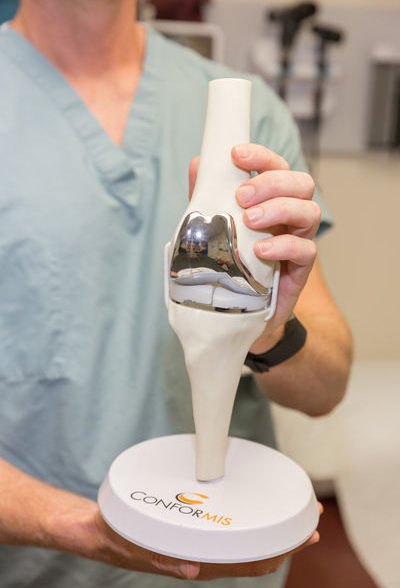
Knee replacement surgery – or knee arthroplasty – has become incredibly commonplace in this country in recent years.
And so have patient complaints.
Dr. Anthony Ware thinks he knows why: The hardware most frequently used to replace natural knee joints today isn’t always a perfect fit.
In fact, it rarely is.
Since 1968, manufacturers of replacement knee joints have produced only a limited number of different sizes of those joints and that has forced orthopedic surgeons to adapt (saw off) more parts of a patient’s natural femur and/or tibia than they’d have liked in order to make those off-the-shelf parts fit. As Ware points out, “Most knee systems will have [only about] eight different sizes.” In the operating room, those replacement joints can’t be cut to fit so the only option has been to cut the patient’s bone.
Now, however, there is another option. Ware is the first orthopedic surgeon in Indian River County to employ a “custom-built” approach to knee replacements. Specifically, the Confomis iTotal G2 system.
“With this knee replacement system,” Ware explains, “the parts are custom-designed for each patient so [the surgeon] doesn’t have to drill into the femur or the tibia like with a lot of other implants.”
The knee is the largest joint in the human body. It is consists of the lower end of the thighbone (the femur), and the upper end of the shinbone (the tibia), along with other structures, and every knee is unique in both size and – most particularly – shape.
Healthy knees allow people to perform all their everyday tasks but if the knee is damaged by osteoarthritis or rheumatoid arthritis, injury or congenital bone defects, tasks as seemingly simple as walking, climbing a small flight of stairs or even getting in and out of a chair can become a painful and sometimes downright dangerous ordeal.
To remedy those situations, many physicians today recommend knee replacement surgery – an operation that has been around for nearly five decades – to relieve that pain, correct joint deformities or injuries and increase mobility. This year the Centers for Disease Control and Prevention projects that close to 1 million knees will be surgically replaced in the U.S.
The problem is that anywhere between 20 percent and 40 percent of patients having the procedure are complaining about residual knee pain long after their operations, which would amount to 200,000-400,000 sore knees out of a million.
Since the American Academy of Orthopedic Surgeons estimates the number of knee replacement procedures will likely exceed the 3 million a year mark by 2030, the number of patient complaints is almost certainly going to grow exponentially over the next 14 years.
Unless, that is, Ware is right and the new approach to knee replacements solves a significant problem with the hardware currently being used by most of his colleagues.
With the Conformis system, a CT scan is made of the existing knee joint and a 3-D image of that knee is then sent to a Conformis manufacturing plant in Massachusetts, where a precise match to that individual’s anatomy is built. 3-D printing is used to form the molds for the metal alloys, cobalt chrome and high-density polyethylene parts of a new, tailor-made knee joint.
Because these joints are individually crafted for the patient’s existing anatomy, there’s less blood loss when the joint is surgically implanted, Ware says.
Ware, who served his residencies in general surgery and orthopedics at the University of Florida Shands Hospital in Jacksonville and received his fellowship training in foot and ankle surgery at the Mayo Clinic, is confident the custom-built approach is the very best knee surgery option available.
Dr. Anthony Ware is with Sebastian River Medical Group. His Vero Beach office is at 1300 36th Street, Suite H-1. The phone number is 772-563-0146. His Sebastian office is at 8005 Bay Street, Suite 2. That number is 772-589-0331.



